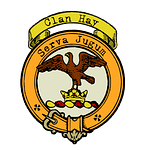Welcome back to "A Clan A Day Podcast," brought to you by bagtownclans.com. I'm your host, Colin MacDonald. Today, we embark on a journey into the compelling saga of Clan Keith, a family whose roots and influence stretch far across Scotland's history. Renowned for their martial prowess, diplomatic skill, and staunch support of both civil and religious liberty, the Keiths were at one time among the most powerful families in Scotland. Let's dive into the story of this illustrious clan, whose legacy has shaped much of Scotland’s political and cultural landscape over the centuries.
The origins of the Keiths are cloaked in mystery and legend. According to some tales, the family descends from the Catti, a Germanic tribe said to have settled in Caithness after being driven from their homeland. However, more credible records date the Keiths' rise to prominence to the 12th century when a baron named Herveus was granted lands in East Lothian by King David I. Herveus de Keith, his son, became the King’s Marischal, a position that would become hereditary and central to the family’s legacy. The office of Marischal, responsible for the safety of the king and his parliament, as well as the safeguarding of Scotland’s royal regalia, was a position of great honor and power.
The Keiths swiftly expanded their influence across Scotland. By the early 13th century, they had acquired extensive lands and titles through strategic marriages and royal favor. A notable figure in the clan’s early history was Sir Robert de Keith, the Great Marischal of Scotland. A close confidant of King Robert the Bruce, Sir Robert played a pivotal role in the Scottish Wars of Independence. His most famous contribution came at the Battle of Bannockburn in 1314, where he led a successful cavalry charge that decimated the English archers, contributing significantly to the Scottish victory. This action not only secured his reputation as a formidable warrior but also cemented the Keiths’ status as one of Scotland’s premier noble families.
Throughout the following centuries, the Keiths remained at the forefront of Scotland’s turbulent political landscape. They were fervent supporters of the Stewart monarchy, yet also ardent advocates of civil and religious liberty. In the 16th century, William Keith, the 3rd Earl Marischal, played a key role in Scotland’s Reformation, inviting the reformer John Knox back to Scotland and promoting Protestantism. His son, George Keith, the 5th Earl Marischal, further solidified the family’s influence by negotiating the marriage of James VI to Anne of Denmark, a diplomatic achievement that brought Scotland closer to its European neighbors.
The Keiths were also known for their grand fortresses, most famously Dunnottar Castle in Aberdeenshire. Perched on a cliff overlooking the North Sea, Dunnottar was a symbol of the Keiths' power and resilience. It played a crucial role during the English Civil War and the subsequent conflicts with Oliver Cromwell’s forces. In 1651, as Cromwell's army swept through Scotland, the Scottish Crown Jewels were secreted away to Dunnottar for safekeeping. Despite a brutal siege, the jewels were successfully hidden by the Keiths and remained out of Cromwell's reach, preserving a critical symbol of Scottish sovereignty.
However, the Keiths’ unwavering loyalty to the Stewart dynasty would eventually lead to their downfall. Following the failed Jacobite uprising of 1715, the 10th Earl Marischal and his brother James Keith, a distinguished military commander, were forced into exile, and the clan’s lands and titles were forfeited. Despite this, both brothers continued to serve in various European courts, with James becoming a Field Marshal in the Russian and Prussian armies, highly regarded for his military prowess and strategic acumen.
George Keith, the last Earl Marischal, eventually found favor with Frederick the Great of Prussia, who recognized the Earl's diplomatic skills and appointed him as his ambassador to Spain. Despite his efforts to restore his family's fortunes, the Earl Marischal never fully regained his ancestral lands or titles in Scotland. His later years were spent in exile, and he remained a steadfast supporter of the Stuart cause until his death.
Today, the Keith legacy continues, both in the ruins of their once-great castles and in the proud traditions carried on by the Clan Keith Society. The Keiths' contributions to Scotland's history are numerous, from their involvement in the Wars of Independence and the Reformation to their diplomatic efforts across Europe. They are a testament to the enduring spirit of Scotland’s noble clans, whose stories continue to captivate and inspire us.
Thank you for joining us today on "A Clan A Day Podcast." Be sure to tune in tomorrow as we explore another chapter in the rich tapestry of Scotland's clan history. I'm Colin MacDonald, wishing you a good day and, as always, Go n-éirí an bóthar leat.











